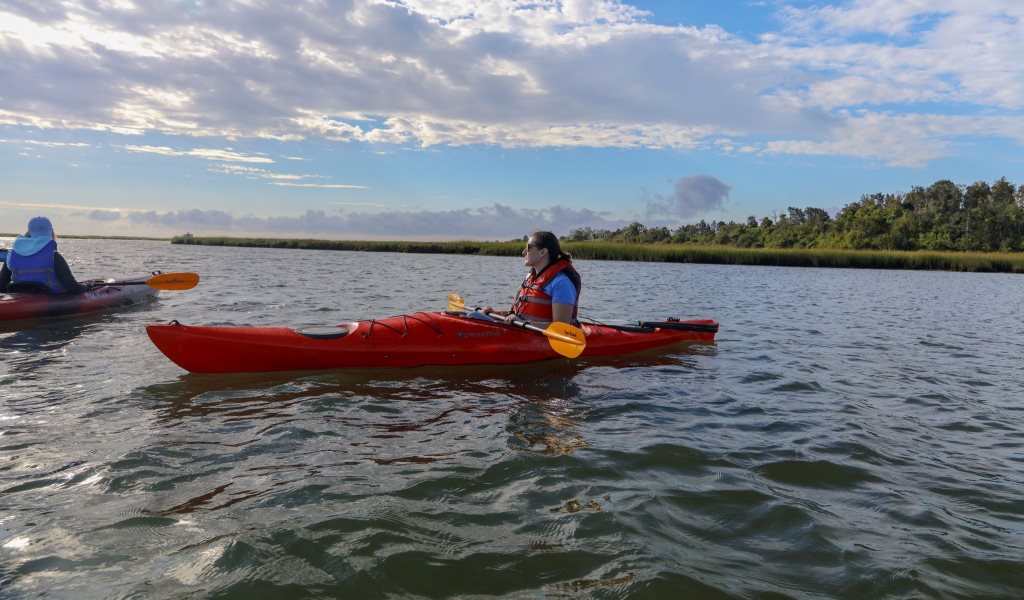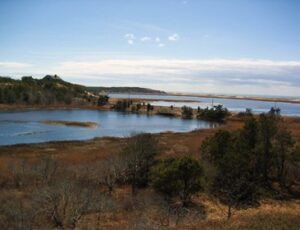Historically, the Herring River in Massachusetts supported a vibrant tidal ecosystem and one of the largest nurseries for commercial and recreational fish and shellfish on Cape Cod.
Then, in 1909, civil engineers constructed a 900-foot dike across the mouth of the river, which blocked tidal flow and caused large-scale environmental degradation.
This is yet another example of the observation made in the 2020 book, RECONOMICS: The Path To Resilient Prosperity: “80% of the revitalizing projects done by civil engineers and urban planners in the 21st century will undo 80% of what their predecessors did in the 20th century.”
Now, on September 19, 2022, local and state leaders celebrated the awarding of $22,670,000 in grant funding to the Town of Wellfleet to support the Herring River Estuary Restoration Project.
“It is a marvel how one project can provide significant benefits to the environment while also serving the local community in so many ways,” said Department of Fish and Game Commissioner Ronald Amidon.
“This work not only improves water quality and habitat, but also enhances the many opportunities for canoeing, kayaking, and wildlife viewing over a diversity of wetland and open-water habitats so residents and visitors alike can enjoy first-hand the natural areas we’re working to restore,” he added.
Funding has been awarded through the state Department of Fish and Game’s (DFG) Division of Ecological Restoration’s (DER) Priority Projects Program.
Back in December 2021, Governor Charlie Baker signed a $4 billion federal COVID-19 relief spending bill utilizing funds from the American Rescue Plan Act of 2021 (ARPA); this award includes $20,000,000 from the ARPA funds and $2,670,000 from DER’s Capital Budget.
“Supporting the restoration of the Commonwealth’s tidal wetlands and waterways is an investment in our future, and directly benefits Massachusetts’ coastal communities and protects natural resources,” said Governor Baker.
“As we continue to face the increasing impacts of climate change, this work and the strong partnerships and dedicated people who drive it forward are essential to a productive and resilient coast,” he added.
The Herring River Estuary Restoration Project will restore up to 890 acres of salt marsh and other estuarine habitats and is the largest tidal estuary restoration ever undertaken in Massachusetts and the northeastern United States.
“The Herring River Estuary Project, which is the largest estuary restoration ever undertaken in our state, will benefit both the region and environment in enormous ways,” said Lieutenant Governor Karyn Polito.
“This project will improve habitat for wildlife and fisheries, increase water quality, enhance recreational opportunities for residents and visitors, and provide critical climate resilience benefits,” she continued.
This grant award will support project construction and provides the Town of Wellfleet with the non-federal match needed to secure $29 million in federal funding from the United States Department of Agriculture’s (USDA) Natural Resources Conservation Service, as well as other anticipated federal grant awards.
“This long-term estuary restoration project serves as a great example of the Baker-Polito Administration’s commitment to fostering strong partnerships with dedicated stakeholders to achieve goals that benefit the public,” said Energy and Environmental Affairs Secretary Beth Card.
“As Massachusetts continues to feel the impacts of climate change from stronger and more frequent storms, the resiliency of coastal communities is a key priority, and we are proud to support the Town of Wellfleet and this incredible project team as they work to restore the health of the Herring River Estuary,” she explained.
The project will replace the existing dike with a new bridge and tide gates to reconnect the Herring River to Wellfleet Harbor and Cape Cod Bay. Additionally, new water control structures will be installed to manage tides in two of the estuary’s sub-basins. Mitigation measures will be completed to protect low-lying roads and structures from increased water levels. Tidal restoration will occur incrementally over several years under an adaptive management framework.
The Priority Projects Program is one of the vehicles by which DER pursues restoration projects that provide significant social, environmental, and economic benefits to the state and local communities, and supports projects throughout the Commonwealth that advance DER’s mission.
Priority Projects underway include restoration of tidal flow to degraded coastal habitats, removal of aging and unsafe dams, and restoration of freshwater wetlands in former cranberry farmlands. To review a full list of active ecological restoration Priority Projects throughout the state, please visit DER’s Restoration Project Map webpage.
“We are so proud to be able to support this amazing effort at this scale,” said DER Director Beth Lambert. “The Herring River Estuary Restoration Project has been in preparation for many years and it is exciting to see it take such a big step forward as all that effort from the entire project team comes to fruition.”
Over 30 local, state, federal, non-profit, and academic partners have collaborated over the past two decades to develop the Herring River Estuary Restoration Project and prepare it for construction.
Led by the Town of Wellfleet and National Park Service, the project is supported by a core team of partners, including the USDA Natural Resources Conversation Service, NOAA Restoration Center, U.S. Fish & Wildlife Service, MA Division of Ecological Restoration, and the non-profit Friends of Herring River.
“This project will dramatically increase our community’s climate resilience, providing new infrastructure, restoring salt marsh and its potential to reduce carbon emissions, and safeguarding the health of shellfish resources so vital to our local economy,” said Town of Wellfleet Town Administrator, Richard Waldo. “We are grateful to the Commonwealth for this significant investment in Wellfleet’s future.”
The mission of the Division of Ecological Restoration is to restore and protect the Commonwealth’s rivers, wetlands, and watersheds for the benefit of people and the environment.
Featured photo courtesy of Mass Audubon Wellfleet Bay Wildlife Sanctuary.


